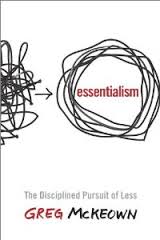
Greg McKeown's publisher sent me an advanced copy of his book Essentialism: The Disciplined Pursuit of Less. I said I would look at for a possible blurb (I don't do advanced praise for a lot of books, in part, because I now insist on reading the whole thing before I do — and it takes time). I was ready to NOT be impressed, as there are frankly lots of books out there about the power of simplicity. But Greg goes beyond what I have seen from any other book with a similar message (although I am a big fan of Matt May's The Laws of Subtraction as well, but that is a different book as it has many short essays, but still has a unified writing and great writing and editing — in fact Matt's book and Greg's would be a good pair to read together).
Through Greg's great message, his lovely spare writing style, and by gently leading the reader through his philosophy he shows you what it "disciplined" approach means, looks like, and how to "be it" not just know how to define it (I loved "the perks of being unavailable," "win big by cutting your losses," and " "select: the power of extreme criteria" in particular).
I was especially interested once I got into the book because one of the major themes of Scaling Up Excellence is that, as although much research shows that we we human beings get dumber, loss will powers, and do each task less well as cognitive load increases, the necessary practices, structures, and rituals that organizations use often make it difficult or impossible for people to perform well (especially as organizations and programs expand). We do touch on some simlar themes to Greg (we are both big advocates of sleep and taking breaks!), but we focus more on approaches for redesigning jobs, teams, and organizations, and our focus zeros in on scaling.
Essentialism is a quick and efficient read, as you would expect given the title, but you learn a lot, and there is something about the book that led me to believe that, despite my general inability to use the word "no" more often than I should for my own good, that this book will help. Although I couldn't quite resist reading the book, doing the blurb, and writing this little post!
My blurb:
“Essentialism is a powerful antidote to the current craziness that plagues our organizations and our lives. Read Greg McKeown’s words slowly, stop and think about how to apply them to your life – you will do less, do it better, and begin to feel the insanity start to slip away.”